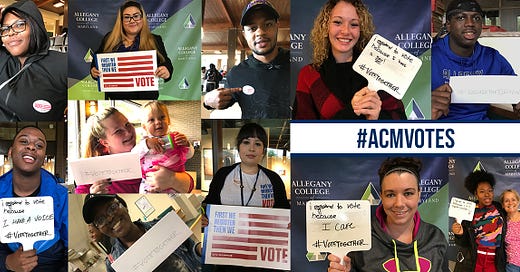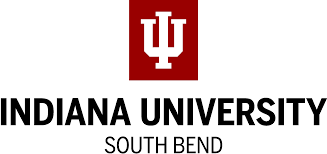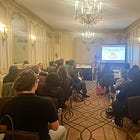New Research Will Address Urgent Questions About How to Mobilize Student Voters Ahead of 2024 Election
We are excited to announce our second round of SVRN grantees. Results from these three projects, testing widely used tactics, could inform student voting efforts nationwide in 2024.
The Student Vote Research Network continues to support collaborations that pursue robust investigations into how best to reach 100% student voter participation. To that end, we are happy to announce the second set of SVRN research grant recipients! In response to our network theme for this round of subgrants, two of these research projects use randomized controlled trials (RCTs) to learn more about student voter mobilization strategies that use the college curriculum and classroom as a space to get 100% of students registered and ready to vote.
These projects are all led by extraordinary scholars and have the potential to yield crucial and timely new knowledge to inform student voter mobilization efforts all across the country during the 2024 elections.
1) When in the semester are various student voter mobilization tactics most effective?
Elizabeth Bennion of IU South Bend will use variations in the academic calendar to better understand how the efficacy of various student voter mobilization strategies is impacted by when they are implemented.
The first project, led by Dr. Elizabeth Bennion of Indiana University South Bend, is a voter registration drive project involving a calendar of events at Indiana University campuses.
This program will include messaging from university leadership, class raps and registration drives, messages via the learning management system Canvas, tabling, and more. Events will be coordinated with related national dates including Constitution Day, National Voter Registration Day, and National Voter Education Week.
Dr. Bennion’s project will harness the power of the date and time stamps of online registration portals to track registration behavior to determine to what degree activities designed to push students toward the registration portal are successful in achieving that result, and to determine whether additional efforts throughout the semester have robust or diminishing returns.
2) How effective are classroom presentations at mobilizing student voters?
Dr. Jennifer Victor of George Mason University will test whether “Class Raps” - 3 to 5 minute classroom presentations about getting registered and ready to vote - are more effective than other tactics and if it matters who gives the presentation.
A second project, led by Dr. Jennifer N. Victor of George Mason University, will test the effectiveness of classroom presentations using Ask Every Student (AES) resources meant to increase voter registration and turnout. Through a partnership with a local community college this RCT will also test whether the effectiveness of these presentations varies by campus.
Dr. Victor will also partner with the local League of Women Voters and other organizations, and will engage students and League members to make the classroom presentations. The RCT will pit classroom interventions against lower-cost interventions such as faculty announcements and email messages, as well as the additive effect of voter pledge cards. It will measure the effectiveness of these classroom presentations on both student attitudes and behavior.
3) What kind of student voting curricula is most effective at community colleges?
Dr. Diane McMahon of Allegany College of Maryland will test two kinds of voter education curricula in a large undergraduate class.
Last but not least, Dr. Diane McMahon will lead a project at Allegany College of Maryland (ACM). ACM is a small community college located in the Appalachian Mountains of Western Maryland, serving a student body that is 80% first-generation college students.
Three sections of the same undergraduate class will be randomly assigned either to control or to complete one of two civic engagement educational interventions in her Intro to Sociology class. One is an adaptation of the Ask Every Student Democracy 101 classroom module to meet the Allegany College general education learning outcome; the other is writing a reflection paper about a short video describing the role of voting in a citizen-led democracy. This RCT will test the effectiveness of these two interventions on student voter registration and turnout in the May 2024 Maryland state election, as well as effects on student attitudes.
The upshot? Scholars and coalition partners are working together to seek crucial insights to inform large scale 2024 student voter education efforts.
At the Student Vote Research Network, we believe that everyone in our movement brings critically important knowledge and perspectives to the work of reaching 100% student voting. Our first round of subgrants funded projects using a wide range of research methods to explore a variety of hypotheses about student voters.
We’re thrilled to support this second round of subgrants that is specifically targeted to inform 2024 programming. We look forward to sharing their results in full with you in the coming months!
I want to thank everyone who replied to our call for proposals and shared ideas for what you are interested in exploring. Please keep sharing your ideas for all kinds of research questions! We hope to be able to support as many of them as possible in the future. It will take the wisdom of ALL of us to reach 100% student voting.
Dr. Melissa R. Michelson is Dean of Arts & Sciences and Professor of Political Science at Menlo College. She chairs the Student Vote Research Network Steering Committee.









Nice